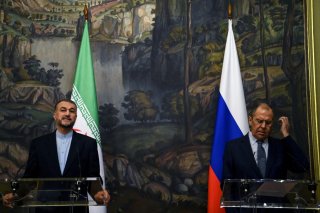New Russian Demand Complicates Iran Nuclear Talks
Secretary of State Blinken argued that any negotiations over sanctions on Russia should be separate from the nuclear talks.
In an apparent rebuke of a demand made by Russia over the weekend, the government of Iran insisted on Monday that it would not allow any foreign powers involved in the ongoing nuclear negotiations in Vienna to force it into or out of an agreement.
“While standing firm in maintaining our red lines, we won’t allow any foreign factors to impact our national interests,” Iranian foreign minister Hossein Amirabdollahian said on Monday, according to the country’s foreign ministry.
Amirabdollahian’s comments come in response to Russian foreign minister Sergei Lavrov’s insistence that the United States produce a written guarantee that Moscow’s trade with Tehran would not be affected by U.S. sanctions. Lavrov’s demand came just days after a raft of harsh sanctions were imposed on Moscow for its invasion of Ukraine.
Lavrov’s comments led to suspicion in Tehran, and several Iranian commentators suggested that they represented a Russian attempt to derail the negotiations for Russia’s benefit. Addressing the controversy, Russia’s ambassador to Tehran, Levan Dzhagaryan, claimed that the discourse surrounding Lavrov’s statement had come from a “misunderstanding” of the Russian position, but did not specify what the foreign minister had meant.
The talks in Vienna have not yet reached an agreement, but negotiators and officials on all sides had suggested that they were close to one in the days leading up to Lavrov’s remarks.
U.S. secretary of state Antony Blinken described Lavrov’s demand as “irrelevant,” indicating that the United States would not address it. Blinken noted that the topic of Russia’s request lay beyond the scope of the original JCPOA, which was essentially an agreement restricting Iran’s ability to enrich uranium in exchange for sanctions relief. Because sanctions on Russia were separate from sanctions on Iran, Blinken suggested that any negotiations over those sanctions be conducted separately. This approach would be similar to how U.S. objections over other aspects of Iran’s foreign policy, such as its development of ballistic missiles and its support for regional anti-government militias, had been separated from the nuclear issue in the interest of expediency.
The Iranian government echoed Blinken’s argument. Foreign Ministry spokesman Saeed Khatibzadeh claimed on Monday that Tehran had attempted to keep the negotiations in Vienna separate from Iran’s other outstanding issues with the West. Khatibzadeh also indicated that the foreign ministry had sought additional information from Moscow regarding its demand for U.S. assurances.
Trevor Filseth is a current and foreign affairs writer for the National Interest.
Image: Reuters.

